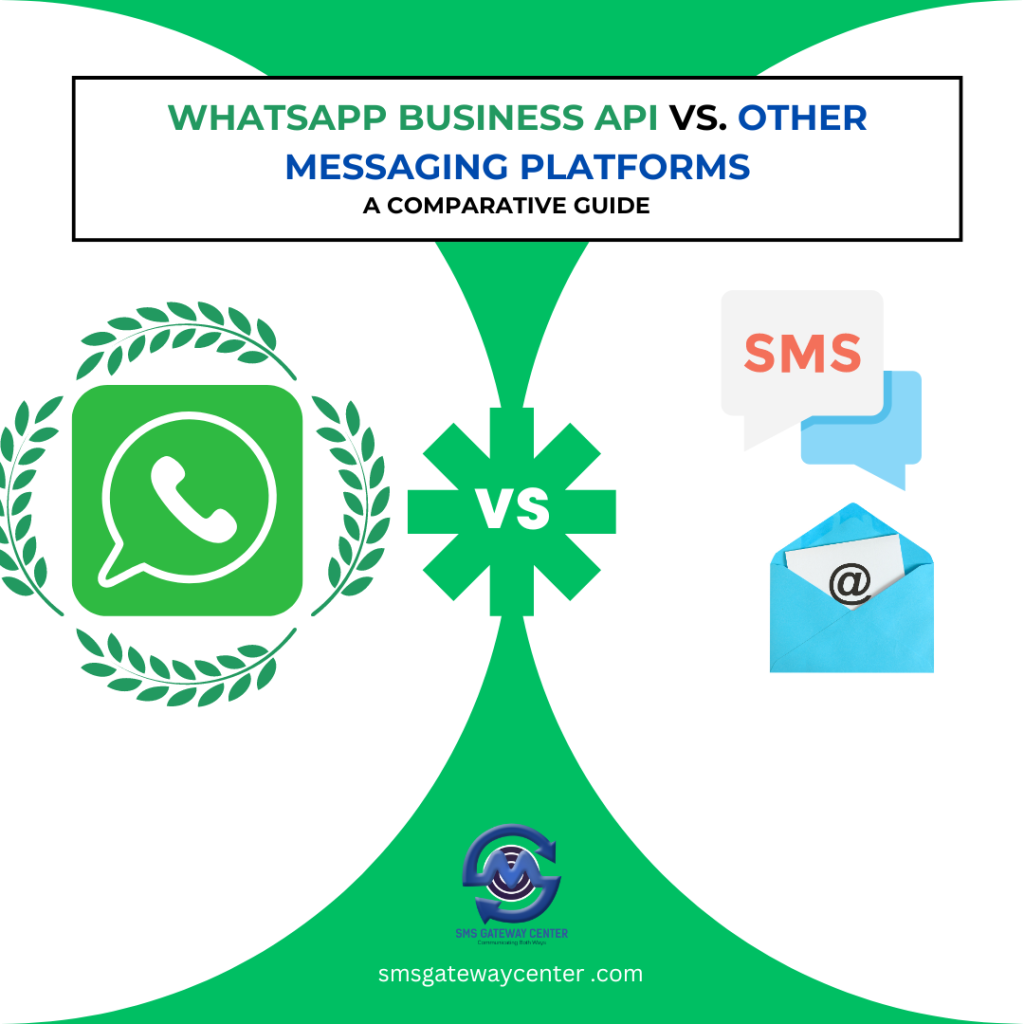WhatsApp Business API vs. Other Messaging Platforms: A Comparative Guide
In the modern digital landscape, businesses have an ever-expanding array of communication platforms to engage with customers. While traditional methods such as SMS and email remain popular, the WhatsApp Business API has quickly emerged as a powerful tool for customer engagement. Each platform has its own strengths, and selecting the right one depends on a company’s objectives, customer base, and overall communication strategy.
In this guide, we’ll compare WhatsApp Business API with other key messaging platforms—SMS and email—helping you make an informed decision on which is the best fit for your business communication needs.

Overview of WhatsApp Business API
The WhatsApp Business API allows medium and large enterprises to communicate directly with customers at scale. Unlike the consumer version of WhatsApp, the API version is designed for businesses to send notifications, offer customer support, and manage conversations programmatically through automation. Given that WhatsApp has over 2 billion active users globally, its massive reach provides businesses with unparalleled access to customers in a familiar environment.
Now, let’s explore how it compares with SMS and email on several key factors:
1. Reach and User Engagement
WhatsApp Business API:
WhatsApp is a dominant messaging platform, especially in regions like India, Latin America, and Europe. Its appeal lies in the fact that it’s already embedded in people’s daily communication habits. By leveraging the API, businesses can reach customers where they’re most active, ensuring higher open rates and real-time interactions.
- Engagement Rate: WhatsApp boasts an exceptionally high engagement rate. The vast majority of messages are opened within minutes of being received, making it ideal for time-sensitive communications like promotions or urgent updates.
SMS:
SMS continues to be one of the most reliable communication channels, particularly in regions with limited internet access. Since SMS doesn’t require an internet connection, it can reach virtually anyone with a mobile phone.
- Engagement Rate: While SMS messages typically have a high open rate (often above 90%), they don’t offer the rich, multimedia experience that WhatsApp does. Additionally, SMS is more commonly associated with transactional messages, and long messages may break into multiple parts, making it less engaging.
Email:
Email remains a staple for business communication, offering a formal and structured way to communicate with customers. However, it tends to be overused, leading to “email fatigue” in customers.
- Engagement Rate: Emails often have low open rates, with an average of around 20-25%. Many users may filter marketing emails into junk or promotional folders, reducing the likelihood of engagement.
Verdict: WhatsApp Business API stands out for user engagement due to its conversational nature and direct access to personal devices. SMS is a close second, particularly in areas where internet access is limited, while email has the lowest engagement rates due to oversaturation.
2. Message Personalization and Rich Media Support
WhatsApp Business API:
One of WhatsApp’s greatest strengths is its ability to support rich media and personalization. Businesses can send images, videos, documents, and even audio files, creating an interactive experience that SMS and email often lack. Furthermore, with personalized messaging capabilities, businesses can create customized conversations based on user preferences, ensuring that communication is more relevant and engaging.
- Personalization and Automation: WhatsApp allows for dynamic personalization, such as addressing customers by name, sending tailored offers, and automating responses through chatbots, enhancing user experience.
SMS:
SMS is more limited when it comes to personalization and rich media. Although some services support MMS (Multimedia Messaging Service), it’s less common and often more expensive than traditional SMS. Moreover, personalised SMS is typically restricted to basic text-based content, limiting the flexibility that WhatsApp provides.
- Personalization and Automation: Personalization is possible but often rudimentary, such as adding a customer’s name or an order confirmation number. Advanced automation features like chatbots are also less prevalent in SMS services compared to WhatsApp.
Email:
Email offers robust personalization capabilities and supports rich media (images, GIFs, attachments, etc.). You can craft highly personalized and visually appealing messages through HTML-based designs, which makes email ideal for long-form content like newsletters or promotional campaigns.
- Personalization and Automation: Email marketing tools allow for high levels of personalization, with the ability to send targeted campaigns based on customer behavior, preferences, and interactions. Automated workflows (e.g., drip campaigns, transactional emails) are common, making email a strong option for personalized, content-rich communication.
Verdict: WhatsApp Business API excels in personal, multimedia-rich interactions, making it ideal for businesses looking to create engaging, real-time conversations with their customers. While email offers advanced personalization and design flexibility, it lacks the immediacy and conversational flow of WhatsApp. SMS, though reliable, is more limited in terms of media and personalization options.
3. Cost-Effectiveness
WhatsApp Business API:
The cost of using WhatsApp Business API can vary depending on the number of messages sent, the region, and the service provider you use. However, it’s generally affordable for businesses, especially considering its high engagement rates. The API’s ability to support automation, rich media, and personalized messages offers good value for the cost.
SMS:
SMS can be expensive when sending bulk SMS messages, especially across different regions or internationally. In some markets, SMS costs can quickly add up, particularly if you’re sending multimedia messages or using premium services like shortcodes.
Email:
Email marketing is the most cost-effective option when it comes to sending bulk messages. Many email service providers offer tiered pricing models, making it affordable for businesses of all sizes. Additionally, there is little to no cost involved in sending an email once a template is designed and automation is set up.
Verdict: Email is the most cost-effective platform for large-scale messaging, while WhatsApp Business API provides a reasonable cost for the high engagement and multimedia capabilities it offers. SMS can become expensive, particularly for businesses with global audiences.
4. Security and Privacy
WhatsApp Business API:
WhatsApp is end-to-end encrypted, ensuring secure communication between businesses and their customers. This is particularly important for industries such as healthcare, banking, or e-commerce, where sensitive information may be shared. The platform’s strict privacy policies also make it a safe option for business communications.
SMS:
While SMS is widely used, it lacks the encryption and security features offered by platforms like WhatsApp. Messages can be intercepted, making it a less secure option for sharing sensitive information.
Email:
Email can be secure, especially when encryption services are used, but it’s more vulnerable to phishing attacks and spam filters. Businesses must ensure that they follow best practices for email security, such as using secure sockets layer (SSL) encryption and educating customers on avoiding phishing.
Verdict: WhatsApp Business API offers the highest level of security with end-to-end encryption, making it a safer choice for sensitive communications compared to SMS and email.
5. Use Cases and Best Practices
WhatsApp Business API:
- Best for: Customer support, personalized promotions, order notifications, and conversational commerce.
- Use Cases: E-commerce businesses using WhatsApp to send order confirmations, delivery updates, and customer service responses.
SMS:
- Best for: Quick, transactional messages like appointment reminders, delivery notifications, and two-factor authentication (2FA).
- Use Cases: Banks and healthcare providers using SMS for security codes or urgent alerts.
Email:
- Best for: Formal communications, newsletters, long-form content, and bulk promotional campaigns.
- Use Cases: B2B companies using email for lead nurturing, product announcements, and transactional emails like invoices or receipts.
Conclusion
When it comes to choosing between WhatsApp Business API, SMS, and email, there’s no one-size-fits-all answer. Each platform has its unique strengths. WhatsApp Business API is unmatched in terms of engagement, real-time communication, and security, making it ideal for businesses looking to build conversational relationships with customers. SMS remains a reliable tool for quick, transactional messages, particularly in regions with limited internet access. Meanwhile, email remains the go-to choice for formal and content-rich communication but struggles with engagement.
Ultimately, businesses should consider adopting a multi-channel approach, leveraging each platform for its specific strengths to create a comprehensive communication strategy. To learn more about how the WhatsApp Business API can transform your customer interactions, visit SMSGatewayCenter.com.

